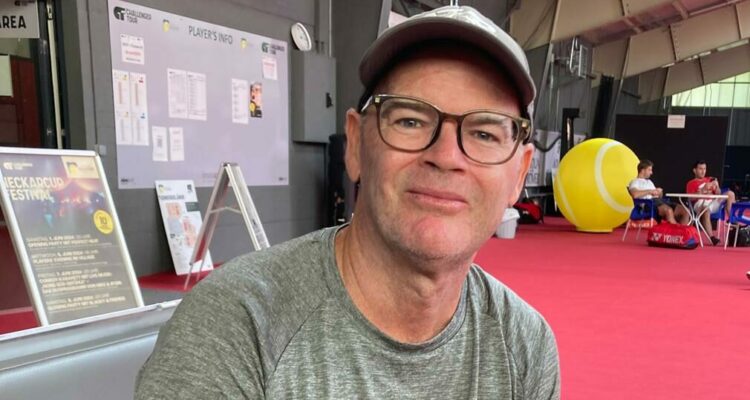HEILBRONN, June 14, 2024
Melbourne, Paris, London, New York City. Professional tennis is a global event, essentially a traveling circus for those involved. Year after year, the top stars of the sport compete on at least four different continents. This also applies to their coaches, who accompany them on the tour. The aforementioned destinations are considered the ultimate goal for every tennis player being the hosts of the Grand Slam tournaments.
However, beyond these glamorous events, there are also players on the Pro Circuit who receive little to no media attention. The stories of some of these “unsung heroes,” who battle through the often-rough tournament landscape week after week, are now known, at least among die-hard tennis fans.
Focus on the Coaches
Less in the spotlight, however, are their coaches. This is partly because many professionals don’t have a so-called “traveling coach” by their side, simply because they can’t afford one, and partly because coaches at smaller tournaments generally fly under the media radar.
“I’m glad you are also interested in the coaches. I appreciate it,” says Robert Davis when a colleague and I ask him for an interview during the recent Neckarcup ATP Challenger event in Heilbronn.
“We can sit down after our training session,” promises Davis. We learned that the native US-American has been living in Asia for years and raises chickens on a farm in Cambodia. In Heilbronn, he is coaching a Japanese doubles team, consisting of Toshihide Matsui and Kaito Uesugi. Both are ranked among the top 150 in the world.
“You have great weather here,” Davis said, as he greets us with a smile at our scheduled meeting. “I just came from Cambodia, and it’s incredibly hot there.”
Final day! 🎾#ATPChallenger #Heilbronn#NECKARCUP pic.twitter.com/9UZLB60MtO
— Florian Heer (@Florian_Heer) June 9, 2024
“The Rudi Gutendorf of Tennis”
What is Davis’ story? “I don’t work in Cambodia in tennis. I just live there. I have been living in Asia for 30 years now: Thailand, Cambodia, Indonesia, Singapore. I chose Cambodia because I could buy land there. My wife and I bought land and built a traditional Asian-style house. On our farm, we grow vegetables, have chickens, and sell eggs. We even bred German Shepherds and sold them to the police and military. Everything is pretty simple. We don’t even have a car; we use bicycles,” says the 53-year-old Davis, who is a native of Virginia but left the United States over 35 years ago.
“I dropped out of high school and worked for a man in tennis who gave me a chance,” Davis said as he describes his career path. “I started coaching pro tennis very young. I was 21 when I was already on the ATP Tour as a coach. Then I went to South America and was the Technical Director for Peru. After that, I was in Panama and then lived in Colombia. From there, I moved to Asia and continued coaching tennis. I was in Thailand, Indonesia, Singapore, Myanmar, always on the Pro Circuit and also working for the national tennis federations.”
If you google Davis’ name, you’ll find a long entry on the ATP website detailing his activities over the past decades. “I have worked in all these countries, but they are small. It sounds good, but it’s not like Germany. It’s a large area on the map but small in terms of tennis. The president of Tennis Cambodia is a good friend of mine. He told me to come and buy some land. My son has been there for 15 years now and works as a national coach.”
Listening to Davis’ fascinating stories, one might think of the famous German football coach Rudi Gutendorf. The native of Koblenz is considered the manager with the most international engagements and is listed in the Guinness Book of Records.
From Singles to Doubles
Davis primarily coaches doubles players today. He has worked with well-known figures like Aisam-Ul-Haq Qureshi.
“Most of them started in singles. But as they got older, they had the choice to either play in smaller tournaments in singles or compete on the main tour in doubles. Qureshi from Pakistan reached World No. 120 in singles but was in the top 10 of the Doubles Rankings. It was never my plan to work mainly with doubles players. My players here also played singles for a long time. Now they just focus on doubles. Matsui has a special goal. He is 46 years old and close to breaking into the top 100. That would be a dream come true for him. For me, it’s exciting to see someone still having dreams, even at an age when many players retire from professional tennis. We’ve been together for 10 years. We are like a family,” says Davis, who founded a company with his wife and has also collaborated with other coaches.
Promoting Asian Coaches
Today, besides his coaching activities, Davis gives online lectures on tennis and coaching worldwide and has written a book, called the Elements of Coaching Professional Tennis. However, one project is particularly close to his heart:
“Together with other coaches, we are trying to promote Asian coaches. The problem in Asia is that people think you need a coach from Europe to be successful. They would always choose a Spanish or German coach over a Japanese coach,” explains Davis, outlining his mission.
“But we also have many qualified coaches in Asia who normally don’t get a chance. That’s a different mentality. We are trying to help Asian coaches get better jobs.”







